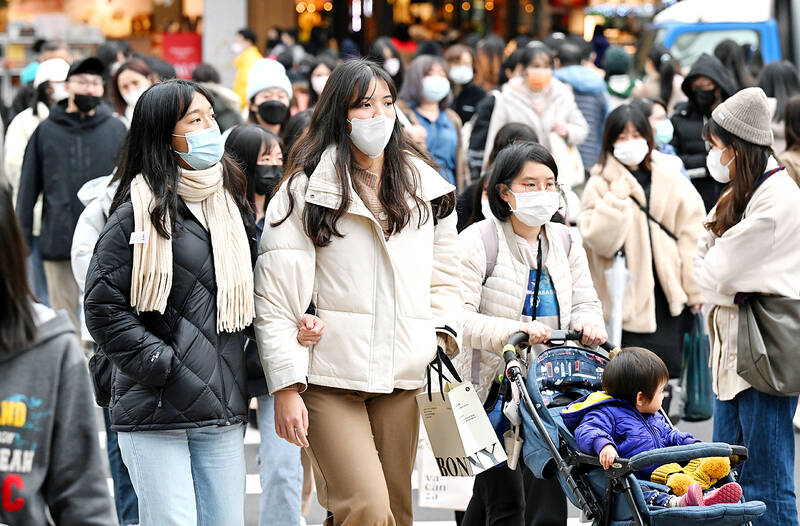COVID-19-related mask requirements could be further eased after the Lunar New Year holiday, the Central Epidemic Command Center (CECC) said yesterday, as it also reported that the Omicron BA.2.75 and BA.5 subvariants of SARS-CoV-2 have become the dominant strains circulating in Taiwan.
Centers for Disease Control (CDC) Director-General Chou Jih-haw (周志浩) reported 15,409 new local cases, about 9 percent down from the number reported on Monday last week, while new imported cases remain relatively high at 223, and 40 deaths from the disease were confirmed.
Deputy Minister of Health and Welfare Victor Wang (王必勝), who heads the center, said 151,838 new local cases were reported last week, which is a 15.7 percent decline compared with the previous week.

Photo: Liao Chen-huei, Taipei Times
The daily case trend suggests that Taiwan has passed the peak of its third wave of Omicron infections and new daily cases are dropping, but case numbers are expected to rebound after the Lunar New Year holiday, he said, adding that whether this would cause a “fourth wave” of infections is difficult to predict.
Wang said the center is planning to implement the second phase of mask mandate easing — which would only require masks in “high risk” indoor venues such as hospitals, long-term care facilities and public transportation — after the Lunar New Year holiday, if the COVID-19 situation remains stable.
The center also plans to downgrade COVID-19 as a category 4 notifiable communicable disease, he added.
Since the temporary arrival test requirement for travelers from China was implemented on Jan. 1, out of 22,057 China arrivals, 3,122 have tested positive, leading to a test positivity rate of 14.1 percent, Wang said, citing data as of Saturday.
CDC Deputy Director-General Chuang Jen-hsiang (莊人祥), who is the CECC spokesperson, said 224 people among 2,408 passengers who arrived from China on Saturday tested positive upon arrival, with a positivity rate of 9.3 percent.
Wang said the positivity rate has been decreasing, but the COVID-19 situation in China is still escalating and the virus is expected to spread from cities to rural areas during the Lunar New Year holiday.
Although new variants have not been detected among travelers from China, the testing program would continue until the end of the month, he said, adding that the center would assess whether it should be extended.
He said the genomic sequencing results on 157 virus samples from infected travelers from China showed that 61.8 percent were infected with the BA.5 strain, 36.9 percent with BF.7 and 1.3 percent with BQ.1.
Meanwhile, CDC Deputy Director-General Philip Lo (羅一鈞) said weekly genomic sequence surveillance data showed that the BA.2.75 subvariant has become a dominant strain, along with the current dominant BA.5 strain.
Of the sequenced imported cases — excluding travelers from China — last week, the BA.5 and BA.2.75 strains constituted 30 percent of the cases each, while the BQ.1 strain made up 20 percent and the XBB strain made up 13 percent, he said.
Of the sequenced local cases, 45 percent were infected with BA.5, followed by 41 percent infected with BA.2.75, Lo said, adding that the two subvariants are likely to constitute most local infections during the Lunar New Year holiday.
The XBB.1.5 subvariant has not yet been detected in Taiwan, Lo said.

The manufacture of the remaining 28 M1A2T Abrams tanks Taiwan purchased from the US has recently been completed, and they are expected to be delivered within the next one to two months, a source said yesterday. The Ministry of National Defense is arranging cargo ships to transport the tanks to Taiwan as soon as possible, said the source, who is familiar with the matter. The estimated arrival time ranges from late this month to early next month, the source said. The 28 Abrams tanks make up the third and final batch of a total of 108 tanks, valued at about NT$40.5 billion

Two Taiwanese prosecutors were questioned by Chinese security personnel at their hotel during a trip to China’s Henan Province this month, the Mainland Affairs Council (MAC) said yesterday. The officers had personal information on the prosecutors, including “when they were assigned to their posts, their work locations and job titles,” MAC Deputy Minister and spokesman Liang Wen-chieh (梁文傑) said. On top of asking about their agencies and positions, the officers also questioned the prosecutors about the Cross-Strait Joint Crime-Fighting and Judicial Mutual Assistance Agreement, a pact that serves as the framework for Taiwan-China cooperation on combating crime and providing judicial assistance, Liang

A group from the Taiwanese Designers in Australia association yesterday represented Taiwan at the Midsumma Pride March in Melbourne. The march, held in the St. Kilda suburb, is the city’s largest LGBTQIA+ parade and the flagship event of the annual Midsumma Festival. It attracted more than 45,000 spectators who supported the 400 groups and 10,000 marchers that participated this year, the association said. Taiwanese Designers said they organized a team to march for Taiwan this year, joining politicians, government agencies, professionals and community organizations in showing support for LGBTQIA+ people and diverse communities. As the first country in Asia to legalize same-sex

MOTIVES QUESTIONED The PLA considers Xi’s policies toward Taiwan to be driven by personal considerations rather than military assessment, the Epoch Times reports Chinese President Xi Jinping’s (習近平) latest purge of the Chinese People’s Liberation Army (PLA) leadership might have been prompted by the military’s opposition to plans of invading Taiwan, the Epoch Times said. The Chinese military opposes waging war against Taiwan by a large consensus, putting it at odds with Xi’s vision, the Falun Gong-affiliated daily said in a report on Thursday, citing anonymous sources with insight into the PLA’s inner workings. The opposition is not the opinion of a few generals, but a widely shared view among the PLA cadre, the Epoch Times cited them as saying. “Chinese forces know full well that